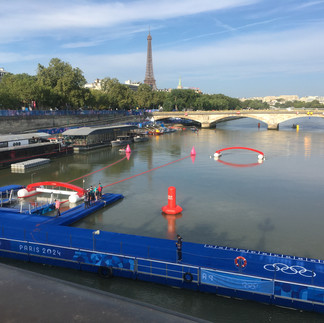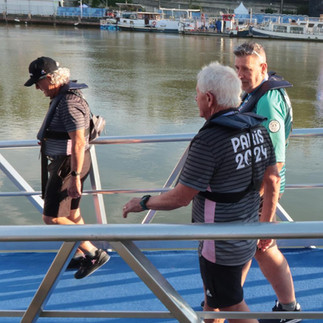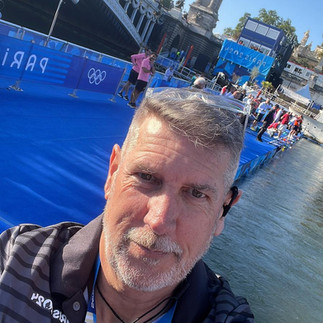Officials Diary - Kiwi Experiences Behind the Scenes in Paris
- dale493
- Nov 8, 2024
- 8 min read
Officials Diary Wrap – Paris 2024 Olympic & Paralympic Games

We had five Kiwis involved in delivery of the recent Paris 2024 Olympic Games and Paris 2024 Paralympic Games. Christine Cassin (Canterbury West Coast) and Ross Gillespie (Northland) made their respective debut as technical officials at an Olympic Games, whilst John West returned for his fourth consecutive Olympic Games. Dr Dave Gerrard returned for his twelfth Olympic Games, whilst Carlrine Gillespie attended her second consecutive Paralympic Games.
Each of these members have shared some insights into what it was like in Paris.
Dr Dave Gerrard
SNZ Life Member Dr Dave Gerrard is no stranger to the big stage, having attended his twelfth Olympic Games in Paris as a World Aquatics Sports Medicine Commission member. Gerrard was in the thick of the action at both the pool and then open water swimming competitions, as well as the water polo. As a member of the committee, Gerrard was responsible for the general oversight of athlete healthcare, working closely with the Paris 2024 doctors.
Gerrard shared that Paris was buzzing, the volunteers were superbly helpful and security were present without being too in your face.
With the much publicised “slow pool”, Gerrard was happy to share that the pool wasn’t slow from his perspective, with four World Records and twelve Olympic Records emphasising there was no concerns with the Paris La Defense Arena competition pool.
Gerrard was also heavily involved with the other hot topic in the lead-up to the Games, water quality of the River Seine for open water. In the four days leading into the first event, Gerrard was at the facility at 4am each morning to check the latest lab test results and provide an update to coaches and athletes. Fortunately, the weather Gods smiled as there was no significant rainfall to pollute the river from stormwater overflow. As the commission liaison for Marathon Swimming, Gerrard was responsible for giving things final approval in collaboration with the IOC medical representative and City of Paris public health services.
Despite the media hype around the event, everything went off without a hitch and there were no post-event reports of health problems from competing swimmers. The results suggested no one was affected by the current, with men finishing around 1 hour 50mins and women around the 2 hours, some great performances from well-prepared athletes.
Whilst Gerrard has been at the Games with different hats over the years, he still felt privileged to be part of it.
“This was my twelfth Summer Olympics, but even so it was a privilege to make a small contribution and to witness some amazing performances. Two things stood out to me – one was our Women’s 4 x 200m Freestyle Relay team making the final, and the second the amazing historic venue on the River Seine. It provided a spectacular sight and close competition. It was great to work alongside a couple of Kiwi colleagues in John and Ross also.”
John West
John West attended his fourth consecutive Olympic Games, this time as the Secretary of the World Aquatics Open Water Technical Swimming Committee. His role was responsible for the management of the technical elements of the competition alongside his fellow committee members, which included running briefings and debriefings, overseeing all operations ran smoothly for the competition from a technical perspective. This role had a larger build up than some others, with West involved in overseeing the delivery of the test event held one year prior to the Games and for determining the swim course on the river.
West shared that the committee faced some challenges, given the venue was technically challenging with a narrow fast flowing river. As part of the course being positioned on one of the most well-known rivers in the world, it also meant the course needed to be set up and packed down each day to allow normal river traffic to occur outside of competition times.
West worked alongside Dr Dave Gerrard and the medical commission, as well as the Paris 2024 Organising Committee, the City of Paris and the International Olympic Committee in monitoring the water quality with all parties working toward the same goal. Despite having to cancel the test event one year prior due to water quality issues, the group remained positive. West shared that the water quality was the biggest challenge faced for the Marathon swim, but the World Aquatics rules were clear and the group applied them. They had developed four different scenario plans if the race could not go ahead on one or more days. This included two contingency venue plans depending on whether canoe/kayak were also using that venue the same day. This resulted in early mornings for West and the team, with the day starting at 2am to observe the meteorological and biological conditions to decide if racing would proceed or not, then informing the teams and the construction crew for the course and platform.
West reflected that the venue and atmosphere were both amazing, with stands on either side of the course full of fans cheering the whole race underneath the picturesque backdrop of the Eiffel Tower in the heart of Paris. West noted it was a completely different experience than three years earlier in Tokyo, when the race was held without any spectators.
Reflecting on his experience in Paris, West was humbled to play a role in bringing the event to life.
“It’s an honour for me to be able to officiate this competition and play a role in making it successful for athletes, coaches, spectators and broadcasters. My favourite moment was as the competitors were being announced for the start of the first race. It was the culmination of all the planning, including multiple contingency plans, and seeing it finally happening the way we intended.”
Ross Gillespie
Ross Gillespie attended his first Olympic Games as a technical official at the Marathon swim in the River Seine. Once the green light had been given by Gerrard, West and the other commission members, the 1.6km course was set up for practice and competition days. The strong current proved a challenge for both the set-up crews, the officials managing the course and the swimmers themselves.
Gillespie joined with the local French officials and other officials from around the world. For the women’s 10km race, Gillespie worked in registration completing pre-race checks before being a finish judge. In the men’s 10km race, Gillespie was an assistant referee, which was a completely different role from the previous day. This role required giving directions to the boat driver as to where to position the boat so they could track and view the swimmers going around the course. However, this proved to be more challenging than expected as the driver didn’t speak English and the current also taking control at times.
The swimmers quickly learnt that it was a tactical race, with picking your race line to move through the current playing a huge role in the outcome of the race. Whilst swimmers were flying down the river, they had to work out the most effective way to swim across the current and when swimming back into it, with most opting to swim as close to the wall hoping to have a reduced current.
Gillespie felt that with the grandstands and bridges crossing the river, the thousands of spectators were in the thick of the action and created an incredible atmosphere for the swimmers.
Gillespie praised the way the teams handled the challenges, none bigger than the water quality, with the first practice day the only time lost.
“The organising committee did an amazing job to make this event happen on the River Seine. It really showcased open water swimming to the world. Both Paris and France can be very proud of hosting an excellent Olympic Games, it will always hold a special place in my heart for me.”
Christine Cassin
Christine Cassin made her debut at the Olympic Games as a technical official. One of the first things that grabbed her attention was the Paris La Defense Arena itself, the largest indoor arena in Europe, hosting 15,000+ spectators for the swimming. Cassin said the atmosphere was absolutely electrifying, from the lighting shows, the big screens, the music and the deafening noise levels from the fans.
Cassin felt privileged to be involved as an official on pool deck in the first couple of days, before getting the opportunity to work in the Video Review Room for the remainder of the Games. She was grateful to still be involved after unfortunately tripping near the Arc de Triomphe in between sessions whilst visiting the sites in Paris. Thankfully her recovery has been going well and World Aquatics accommodated for her injury.
Cassin shared what it meant to be able to officiate at the Olympics.
“Being a technical official in Paris was a once in a lifetime opportunity, something I feel very honoured to have been selected for. It’s a dream come true.”
Carlrine Gillespie
Carlrine Gillespie was our only official at the Paralympic Games held a few weeks later, where she attended her second consecutive Games. Gillespie was one of the thirteen international officials selected for Paris, working alongside the two lead Technical Delegates and the local French national officials. In conjunction with the Omega timing team, World Para Swimming staff and volunteers, Gillespie was part of a fantastic collective that made the environment even more special.
The competition was held in the same location, Paris La Defense Arena, as the pool swimming at the Olympic Games. Gillespie said it was hard to believe the stadium usually hosts rugby and concerts given the set-up of extra grandstands and two 50m pools on the normal field of play.
The 15,000 seats were filled to maximum capacity at most times, creating a surreal and amazing atmosphere, with the athletes and crowd combining to make it a special experience. The cheering was unbelievably loud, loud enough that your ears were ringing, but incredibly it would go up a notch when a French swimmer was announced or in the pool. The crowd were fair to all swimmers though, at most times cutting the noise to silence for the start of each race.
Gillespie felt honoured to play her part in a variety of key roles across the ten days of competition, most notably as a referee for three days alongside David Metcalf (Great Britain). Gillespie was also a judge of stroke for three days, spent two days as the call room supervisor, and a day each as chief inspector of turns and the resolution desk.
There were incredible performances by the athletes, with a total of 31 World Records broken. Gillespie noted that you could not help but be touched with the same emotion as the swimmers, as you could see and feel their disappointments and successes.
There were multiple highlights for Gillespie, including the experience of being at the Paris 2024 Paralympic Games. Gillespie attended the opening ceremony at the outdoors venue at Place de la Concorde, where she saw Cameron Leslie (Whangarei) lead the New Zealand team. Another highlighted including living in the Paralympic Games Village, staying in a four bedroom apartment with the same cardboard beds and duvet that the athletes had. Her apartment was a 20 minute walk from where she needed to catch the bus before a 30 – 40 minute transit took place.
Given the length of sessions and the distance between the village from the competition venue, Gillespie opted to stay at the venue in between heats and finals most days. There was a large officials room with snacks and drinks which helped fuel the team. It meant there were long days with early starts and late returns, but it meant Gillespie spent more time with her fellow French and international colleagues.
A nice touch that World Para Swimming organised was for one of the officials to represent the team by doing the Coup de Baton to open one of the heat sessions. Another nice little recognition from World Para Swimming was each official being presented with an engraved whistle.
Overall, Gillespie loved her experience in Paris and humbled to be involved.
“The Paralympics is pure inspiration and collectively the team were very proud to play a tiny part in making this event happen. It is and will always be about the athletes, the importance of inclusive sports and the values they promote.”
We would also like to acknowledge and congratulate another Kiwi from our aquatic whanau, Luciana Garcia Genta, who attended Paris as part of her role on the Artistic Swimming Technical Committee.
Thanks to each of our Kiwis sharing their insights about what life was like helping to deliver the swimming competitions in Paris. Congratulations on your appointments and for acquitting yourselves to high standards on the international stage, well deserved recognition for each of you.






































Comments